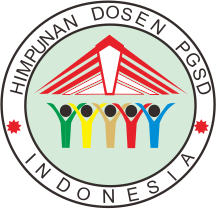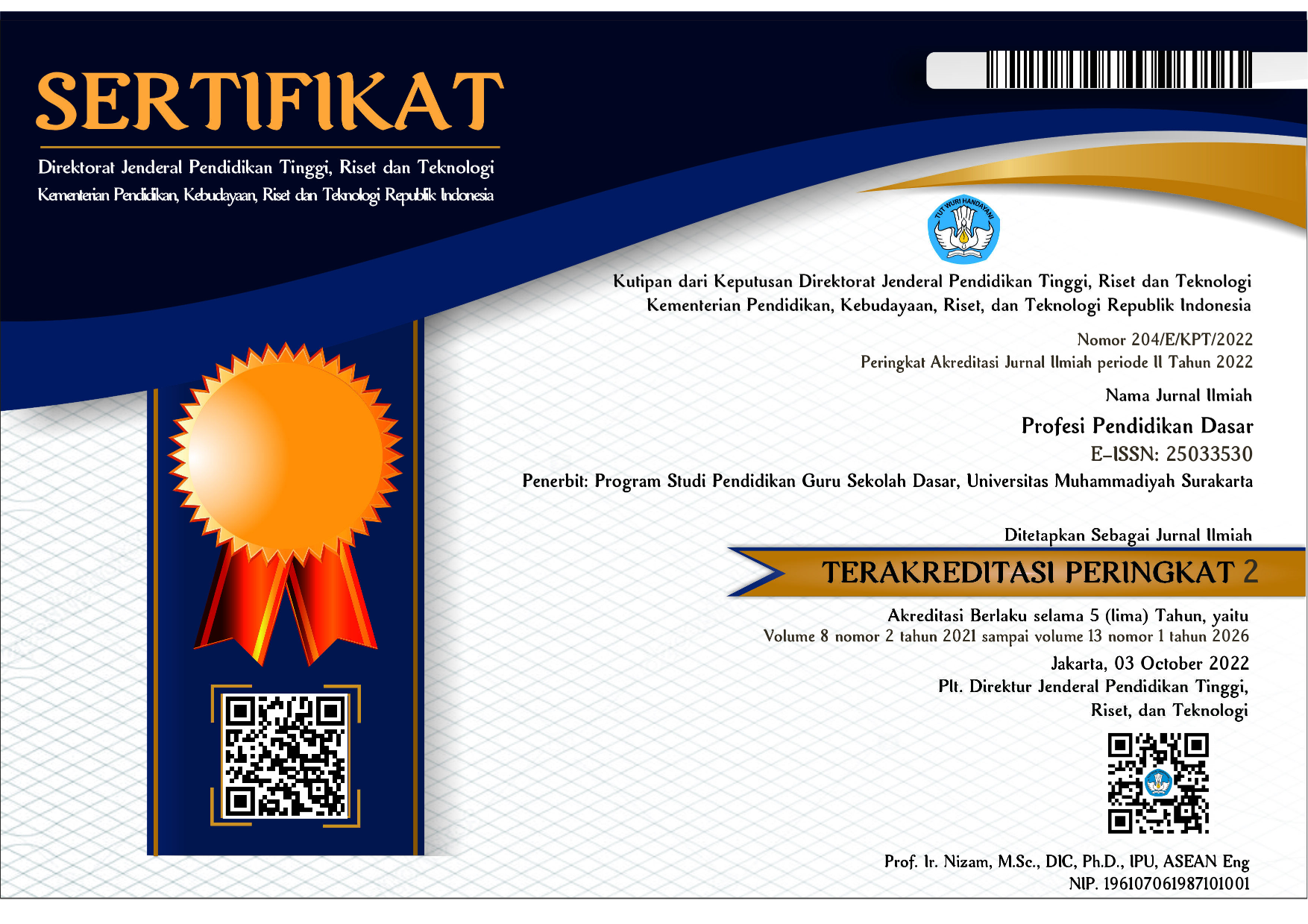Communication Skills Profile of Elementary Teacher Education Students in STEM-based Natural Science Online Learning
Duhita Savira Wardani(1*), Jajang Bayu Kelana(2), Zingiswa Mybert Monica Jojo(3)(1) Institut Keguruan dan Ilmu Pendidikan Siliwangi, Cimahi, Indonesia
(2) Institut Keguruan dan Ilmu Pendidikan Siliwangi, Cimahi, Indonesia
(3) University of South Africa, South Africa
(*) Corresponding Author
Abstract
Keywords
Full Text:
PDFReferences
Afriana, J., Permanasari, A., & Fitriani, A. (2016). Penerapan Project Based Learning Terintegrasi STEM Untuk Meningkatkan Literasi Sains Siswa Ditinjau Dari Gender (Implementation Of STEM Integrated Project Based Learning To Improve Students' Scientific Literacy In Terms Of Gender). Jurnal Inovasi Pendidikan IPA, 2(2), 202. https://doi.org/10.21831/jipi.v2i2.8561
Beck, J. (2011). Cognitive behavior therapy: Basics and beyond. London: The Guilford Press. Bybee, R. W. (2013). The Case for STEM Education: Challenges and Opportunities. Virginia:
NSTA Press.
Dantes, N. (2012). Metode Penelitian (Research Method). Yogyakarta: Andi Offset. Dharmayanti, P. A. (2013). Teknik Role Playing Dalam Meningkatkan Keterampilan
Komunikasi Interpersonal Siswa SMK (Role Playing Techniques to Improve Interpersonal Communication Skills of Vocational School Students). Jurnal Pendidikan Dan Pengajaran. 46(3), 256-265. http://dx.doi.org/10.23887/jppundiksha.v46i3.4228.
Dipalaya, T., Susilo, H., & Corebima, A. D. (2016). Pengaruh Strategi Pembelajaran PDEODE (Predict-Discuss-Exolain-Observe-DiscussS- Explain) pada Kemampuan Akademik Berbeda terhadap Keterampilan Komunikasi Siswa (The Effect of PDEODE (Predict- Discuss-Exolain-Observe-DiscussS- Explain) Learning Strategies on Different Academic Abilities on Students' Communication Skills). Jurnal Pendidikan, 1(9), 1713-1720.
http://dx.doi.org/10.17977/jp.v1i9.6723
Firdaus, A. R., Wardani, D. S., Altaftazani, D. H., Kelana, J. B., & Rahayu, G. D. S. (2020). Mathematics learning in elementary school through engineering design process method with STEM approach. In Journal of Physics: Conference Series, (Vol. 1657, No. 1, 012044). IOP Publishing. https://doi.org/10.1088/1742-6596/1657/1/012044
Fraenkel, J.R., and Weelen, N. E. (2008). How to Design and Evaluate research in Education.
McGraw-Hill.
Greenstein, L. (2012). Assessing 21st century skills: A guide to evaluating mastery and authentic learning. california: Corwin SAGE Company.
Guilford, J. P. (1950). Creativity. American Psychologist, 5(9), 444–454. https://doi.org/10.1037/h0063487
Guilford, J. P. (1967). Creativity: Yesterday, Today and Tomorrow. The Journal of Creative Behavior, 1(1), 3-14. https://doi.org/10.1002/j.2162-6057.1967.tb00002.x.
Haryanti, A., & Suwarma, I. R. (2018). Profil Keterampilan Komunikasi Siswa Smp Dalam Pembelajaran IPA Berbasis STEM (Profile of Junior High School Students' Communication Skills in STEM-Based Natural Science Learning). WaPFi (Wahana Pendidikan Fisika), 3(1), 49-54. https://doi.org/10.17509/wapfi.v3i1.10940
Hausberg, M. C., Hergert, A., Kröger, C., Bullinger, M., Rose, M., & Andreas, S. (2012). Enhancing medical students’ communication skills: Development and evaluation of an undergraduate training program. BMC Medical Education. 12(19), 1-9.
https://doi.org/10.1186/1472-6920-12-16
Ilyas, A., & Marjohan. (2013). Hubungan Antara Keterampilan Komunikasi Dengan Kecemasan Berbicara Di Depan Umum (The Relationship Between Communication Skills And Public Speaking Anxiety). Konselor. 2(1), 273-278. https://doi.org/10.24036/02013211203-0-00
Kelana, J.B., Wardani, D.S., & Wulandari, M. A. (2021). Penggunaan Aplikasi Zoom Meeting Di Masa Pandemi Covid-19 (Use of the Zoom Meeting Application During the Covid-
Pandemic). Elementary, Jurnal, 4(1), 18–22. http://journal.ummat.ac.id/index.php/elementary/article/view/3520.
Kelana, J. B., & Wardani, D. S. (2021). Model Pembelajaran IPA SD (Elementary Science Learning Model). Cirebon: Edutrimedia Indonesia.
Kelana, J. B., Wardani, D. S., Firdaus, A. R., Altaftazani, D. H., & Rahayu, G. D. S. (2020). The effect of STEM approach on the mathematics literacy ability of elementary school teacher education students The effect of STEM approach on the mathematics literacy ability of elementary school teacher education students. In Journal of Physics: Conference Series, (Vol. 1657, No. 1, 012006). IOP Publishing. https://doi.org/10.1088/1742-6596/1657/1/012006
Maida, C. A. (2011). Project-based learning: A critical pedagogy for the twenty-first century. Policy Futures in Education, 9(6), 759-768. https://doi.org/10.2304/pfie.2011.9.6.759 Marfuah, M. (2017). Meningkatkan Keterampilan Komunikasi Peserta Didik melalui Model Pembelajaran Kooperatif Tipe Jigsaw (Improve Students' Communication Skills through the Jigsaw Type Cooperative Learning Model). Jurnal Pendidikan Ilmu Sosial.
(2), 148-160. https://ejournal.upi.edu › jpis › article › download › pdf.
Maryanti, S., Zikra, ., & Nurfarhanah, . (2012). Hubungan antara Keterampilan Komunikasi dengan Aktivitas Belajar Siswa (Relationship between Communication Skills and Student Learning Activities). Konselor, 1(2), 1-8.
https://doi.org/10.24036/0201212700-0-00.
Nafiah, Y. N., & Suyanto, W. (2014). Penerapan model problem-based learning untuk meningkatkan keterampilan berpikir kritis dan hasil belajar siswa (Application of problem-based learning models to improve critical thinking skills and student learning outcomes). Jurnal Pendidikan Vokasi, 4(1), 125-143.
https://doi.org/10.21831/jpv.v4i1.2540
Nurcholis, A., Suciati, & Indrowati, M. (2013). Implementation of Prolem Based Learning (PBL) Model Accompanied by Scientific Articles for Increasing Creative Thinking Ability Student in X3 Class SMAN 2 Boyolali Academic Year of 2012/2013. Bio-Pedagogi, 2(2), 58–67. https://jurnal.uns.ac.id/pdg/article/view/5300/4698
Priansa, D. J. (2015). Manajemen Peserta Didik dan Model Pembelajaran (Student Management and Learning Models). Bandung: Alfabeta.
Saenab, S., Yunus, S. R., & Virninda, A. N. (2017). PjBL untuk Pengembangan Keterampilan Mahasiswa: Sebuah Kajian Deskriptif Tentang Peran PjBL dalam Melejitkan Keterampilan Komunikasi dan Kolaborasi Mahasiswa (PjBL for Student Skills Development: A Descriptive Study of the Role of PjBL in Boosting Student Communication and Collaboration Skills). Makassar: Seminar Nasional Lembaga Penelitian UNM (National Seminar of the UNM Research Institute.)
Stohlmann, M., Moore, T., & Roehrig, G. (2012). Considerations for Teaching Integrated STEM Education. Journal of Pre-College Engineering Education Research. Journal of Pre-College Engineering Education Research 2(1), 28–34. https://doi.org/10.5703/1288284314653
Sugiyono. (2012). Metodologi Penelitian Pendidikan Pendekatan Kuantitatif, Kualitatif dan R&D (Educational Research Methodology Approaches to Quantitative, Qualitative and R & D). Bandung: Alfabeta.
Thomas, C. M., Bertram, E., & Johnson, D. (2009). The SBAR communication technique: Teaching nursing students professional communication skills. Nurse Educator. 34(4), 176-180. https://doi.org/10.1097/NNE.0b013e3181aaba54
University of Baltimore. (2010). Assessment Rubrics for Communication: Oral Communication Skills. https://www.ubalt.edu/merrick/student- resources/rubrics.cfm.
Wardani, D. S., Fauzi, M. R., Zafira, R., & Kurniawati, D. (2020). Creating Props: Improving Writing Skills of Teaching Materials of Elementary Teacher Education Students through Project-Based Learning Model. Mimbar Sekolah Dasar, 7(2), 216–234. https://doi.org/10.17509/mimbar-sd.v7i2.26334
Yuniarti, T. & Hadi, S. (2015). Peningkatan Kemampuan Analisis Pokok Bahasan Masalah Ekonomi Dengan Model Pembelajaran Problem Based Learning (Pbl) Siswa Sma Negeri 1 Bandongan Kabupaten Magelang (Increasing the Ability to Analyze the Subjects of Economic Problems with the Problem Based Learning (Pbl) Learning Model of SMA Negeri 1 Bandongan Students in Magelang Regency). Dinamika Pendidikan, 10(1), 76–87. https://doi.org/10.15294/dp.v10i1.5096
Article Metrics
Abstract view(s): 1556 time(s)PDF: 971 time(s)
Refbacks
- There are currently no refbacks.


















